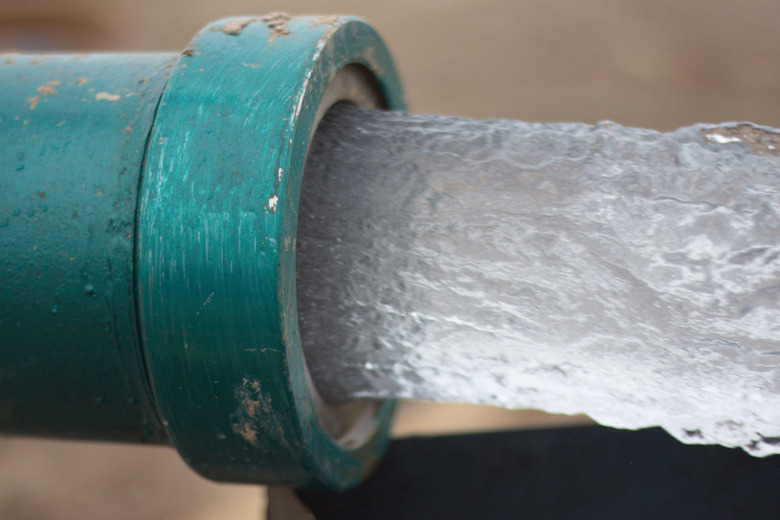How To Calculate Water Flow Through A Pipe Based On Pressure
In physics, you've probably solved conservation of energy problems that deal with a car on a hill, a mass on a spring and a roller coaster in a loop. Water in a pipe is a conservation of energy problem too. In fact, that's exactly how mathematician Daniel Bernoulli approached the problem in the 1700s. Using Bernoulli's equation, calculate the flow of water through a pipe based on pressure.
Calculating Water Flow with Known Velocity at One End
1. Convert Measurements to SI Units
Convert all measurements to SI units (the agreed-upon international system of measurement). Find conversion tables online and convert pressure to Pa, density to kg/m3, height to m and velocity to m/s.
2. Solve Bernoulli's Equation
Solve Bernoulli's equation for the desired velocity, either the initial velocity into the pipe or the final velocity out of the pipe.
Bernoulli's equation is:
\(P_1+0.5pv_1^2+pgy_1=P_2+0.5pv_2^2+pgy_2\)
where P1 and P2 are initial and final pressures, respectively, p is the density of the water, v1 and v2 are initial and final velocities, respectively, and y1 and y2 are initial and final heights, respectively. Measure each height from the center of the pipe.
To find the initial water flow, solve for v1. Subtract P1 and pgy1 from both sides, then divide by 0.5p. Take the square root of both sides to obtain the equation:
\(v_1=\sqrt{\frac{P_2+0.5pv_2^2+pgy_2-P_1-pgy_1}{0.5p}}\)
Perform an analogous calculation to find final water flow.
3. Substitute Measurements for Each Variable
Substitute your measurements for each variable (the density of water is 1,000 kg/m^3), and calculate the initial or final water flow in units of m/s.
Calculating Water Flow with Unknown Velocity at Both Ends
1. Use Conservation of Mass
If both v1 and v2 in Bernoulli's equation are unknown, use conservation of mass to substitute:
\(v_1=\frac{v_2A_2}{A_1}\text{ or }v_2=\frac{v_1A_1}{A_2}\)
where A1 and A2 are initial and final cross-sectional areas, respectively (measured in m2).
2. Solve for Velocities
Solve for v1 (or v2) in Bernoulli's equation. Then find the initial water flow,
\(v_1=\sqrt{\frac{P_2+pgy_2-P_1-pgy_1}{0.5p-0.5p(\frac{A_1}{A_2})^2}}\)
Perform an analogous calculation to find final water flow.
3. Substitute Measurements for Each Variable
Substitute your measurements for each variable, and calculate the initial or final water flow in units of m/s.
Cite This Article
MLA
Boley, Allison. "How To Calculate Water Flow Through A Pipe Based On Pressure" sciencing.com, https://www.sciencing.com/calculate-water-flow-through-pipe-based-pressure-2685/. 13 December 2020.
APA
Boley, Allison. (2020, December 13). How To Calculate Water Flow Through A Pipe Based On Pressure. sciencing.com. Retrieved from https://www.sciencing.com/calculate-water-flow-through-pipe-based-pressure-2685/
Chicago
Boley, Allison. How To Calculate Water Flow Through A Pipe Based On Pressure last modified March 24, 2022. https://www.sciencing.com/calculate-water-flow-through-pipe-based-pressure-2685/
